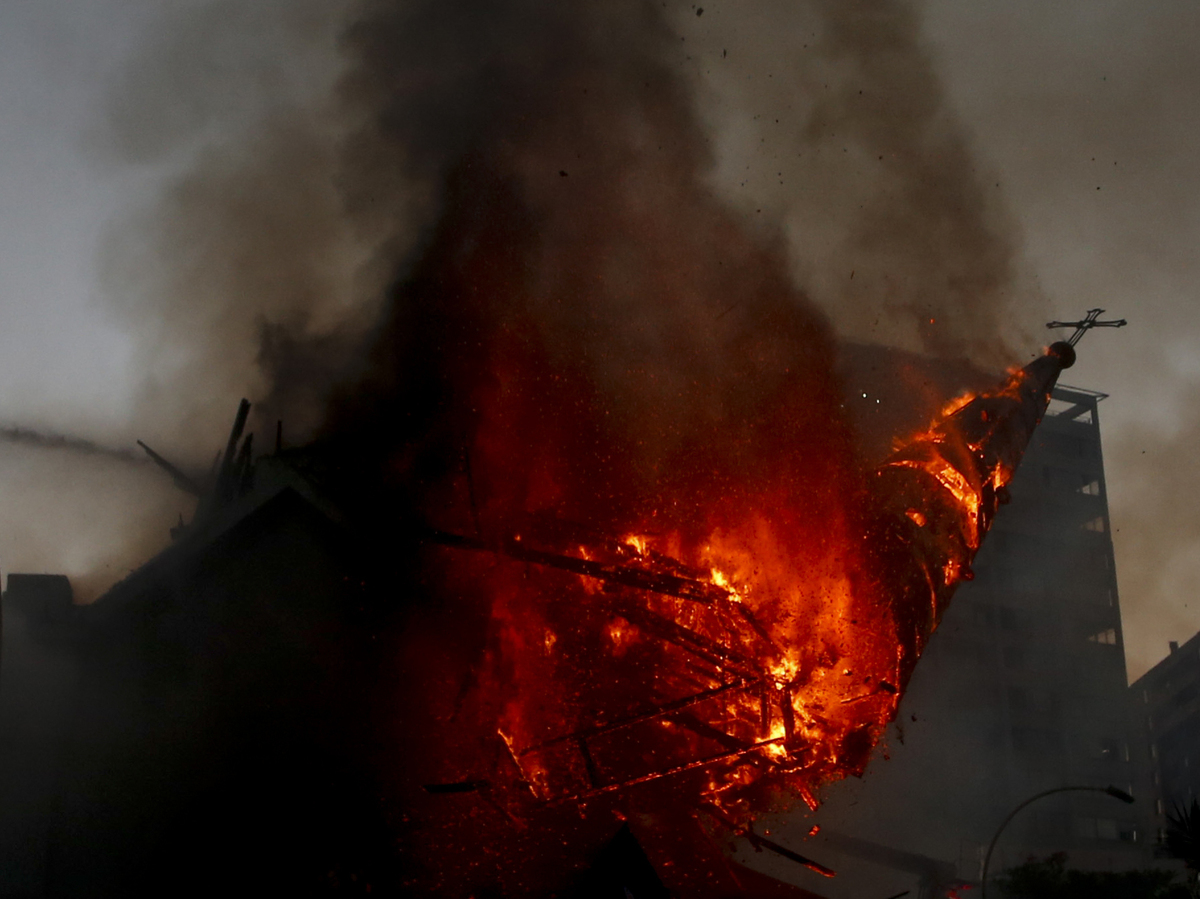‘Historic Opportunity’: Chile Holds Vote To Replace Dictatorship-Era Constitution

Enlarge this image
A man waves campaign flags in favor of a new constitution ahead of a referendum on the matter in Santiago, Chile, on Aug. 26. In a referendum on Sunday, Chileans will vote whether to scrap the constitution from the dictatorship of Gen. Augusto Pinochet.
Esteban Felix/AP
hide caption
toggle caption
Esteban Felix/AP

Enlarge this image
The dome of La Asunción church collapses after it was attacked and set on fire on the first anniversary of the outbreak of anti-government mass protests over inequality in Santiago, Chile, on Oct. 18.
Luis Hidalgo/AP
hide caption
toggle caption
Luis Hidalgo/AP
The dome of La Asunción church collapses after it was attacked and set on fire on the first anniversary of the outbreak of anti-government mass protests over inequality in Santiago, Chile, on Oct. 18.
Luis Hidalgo/AP
The protests were by far the largest in Chile since the return to democracy in 1990, and severely shook the country of 19 million — until recently considered one of Latin America’s more stable and prosperous nations.
They left at least 30 Chileans dead and thousands injured. According to Chile’s National Institute of Human Rights, 460 people suffered eye trauma injuries, mostly caused by police rubber pellets and tear gas canisters. Although the mass demonstrations were largely peaceful, rioters and vandals torched shops and businesses, and trashed metro stations, causing several billions of dollars in estimated damages.
«Only helps businessmen»
In November, as pressure mounted on Chile’s deeply unpopular billionaire president, Sebastián Piñera, the country’s political parties in Congress hammered out an agreement to hold a constitutional referendum in April. This was later postponed because of the coronavirus pandemic.
Since then, the issue has been the focus of heated debate. Earlier this year, NPR visited a crowded Santiago fruit market and found divided views. Housewife Monica Daza, 60, said she welcomes a new constitution because the current one «only helps businessmen, not the public.» Lemon salesman Juan Carlos Godoy, 47, said «we don’t see how it’ll change our lives.»
The referendum asks Chileans if they want to get rid of the 1980 constitution and, if so, how a new one should be drafted. Voters are offered a choice between an entirely new elected constitutional assembly, or a hybrid body comprising current lawmakers and elected citizens.
Discussions are expected to grind on for months as the assembly thrashes out what kind of country Chile should now become. Once complete, the new constitution will be put to a second referendum.
Many Chileans are eager to dump the Pinochet-era document because they view it both as a symbol of the dictatorship, and the embodiment of an economic system that prioritizes the market economy over social welfare.
The country now has a «historic opportunity» to replace an «illegitimate constitution … determined by a dictator and imposed by force» with a «new social agreement,» said Claudio Nash, a professor of international law at the University of Chile.
«In Chile the right to health is not guaranteed as a right,» he said. «What is guaranteed is the freedom of people to choose the health system they want — the public system, the private system — but access to quality health care is not guaranteed.»
«Not getting what they were promised»
Yet some Chileans dispute whether a new constitution will solve the country’s underlying issues.
«My concern is that we are setting ourselves up for a process that will ultimately fail and lead people to a higher level of disappointment with the political system, because they are not getting what they were promised they would get,» said political scientist Patricio Navia, during a Wilson Center discussion last week.
Navia argued that Chileans are mainly looking to the new charter to provide them with expanded social rights. «What they will get is a whole new constitution, and not necessarily a longer bill of rights that can be enforced,» he said.
Navia pointed out those who would draft the new constitution would not address the cost of the promises it enshrines, and said Chile’s next government will be under strong pressure because «it’s just going to be impossible to come up with enough money.»
- Chilean constitution
- Chilean referendum
- Chilean politics
- Chile protests
- Augusto Pinochet
- South America
- Chile














Комментарии 0